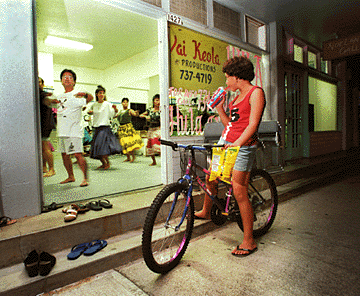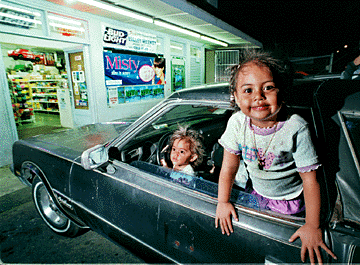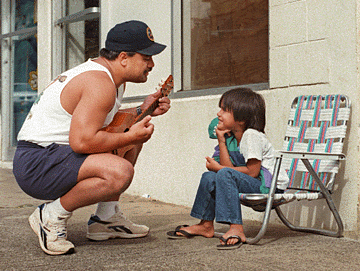
Passersby like Leahi Frias, 10, often stop to check out
practice sessions at Derek Nuuhiwa's hula studio.

Passersby like Leahi Frias, 10, often stop to check out
practice sessions at Derek Nuuhiwa's hula studio.
 Kawamoto Orchid Nursery, 2630 Waiamao Road
Kawamoto Orchid Nursery, 2630 Waiamao RoadFor 49 years, the Kawamoto Orchid Nursery has cultivated and sold the exotic flowers with pedigree names, but it's only been in recent years that many kamaainas have learned about the blooming family business.
For years, the nursery concentrated on island visitors, advertising primarily in tourist publications. An elaborate catalog lists dozens of varieties of orchids, from $6 to $30, ready to be shipped around the world. There's even an orchid-of-the-month club.
"We never sold to garden shops or participated in flower shows," explained Les Kawamoto, whose father, Patrick, started the nursery in Manoa Valley in 1947.
Last year, the nursery held its first annual open house, aimed at luring kamaainas.
"It's getting more competitive because the economy is slow," Kawamoto said of business. "But it's a friendly type of competition."
The nursery boasts more than 350,000 orchids in various stages of development. A 3,500-square-foot greenhouse is the retail showroom, ablaze in lavender, yellow, orange, red, green and variegated blooms. In back, hundreds of small green pots nurture seedlings awaiting their turn in the sun.
"There are so many varieties of orchids, we don't know how many we have," Kawamoto, 46, said.
After outgrowing their Manoa property, the Kawamotos moved in 1976 to Palolo, where two previous orchid nurseries thrived.
"Most are family-run," Kawamoto said of orchid growing. "It has to be because you have to be a little closer to the plants to really make it go. You cannot come in just a couple times of week."
It's just a few steps from his house to the greenhouse.
Kawamoto's father is retired and his mother is semi-retired. Daughter Nicole, 16, is in high school and daughter Kristi, 20, attends the University of Washington. Son Reid, 22, "has aspirations to work in this business. We'll see," said Kawamoto, who "grew up running away from it." But after working in the restaurant industry, he returned to the homestead, taking charge in 1985.
"I like orchids," he says. "They grow on you."

Ashlyn, 1, sitting behind the steering wheel, and sister Sandra, 3,
wait for mom Aileen Seiuli, who stopped at Valley Market
for some chips and soda.
 Frank's Palolo Market, 1829 Palolo Ave.
Frank's Palolo Market, 1829 Palolo Ave.But people know it's where you can get produce for a fair price, a tasty Hawaiian plate lunch for $6 or $7, and dried aku and other local goodies to take on visits to the mainland.
It's also where you can get an understanding break when the check just isn't enough.
"For a store like this (to survive), you have to have a feel for the community," says co-owner Barbara Ryder. "When you compare us with the big supermarkets, you can see we're priced for the community, a lot of them from (public) housing - people who have to watch their budgets."
So, ground hamburger, for example, sells for $1.29 a pound, while "sales prices of produce at the big markets are often our regular prices," she said. "We're able to do that because we're part of the Independent Grocers of Hawaii."
More importantly, a neighborhood grocery has to have a rapport with customers.
A small sign warns cashiers of certain people who have taken advantage of a helping hand. But generally, when familiar customers "have problems and they need food, we'll give them a break," Ryder said. "It's like the olden days. Kids come in, they ask, 'Can I go show my mom this?' and they run outside (with the item)."
Ryder's brother, Ralph Teruya, was in the retail business but "always wanted a place of his own." When the Tanabe family put their Marujyu Market in Palolo up for sale, Teruya convinced his sister to join him. They took over the market in 1991, naming it after their father.
There are nine full-time workers, including three who handle the lunch and fresh food counter.
"I like this community," she said. "I don't know what it is I like. But when customers come in, they don't come here crabby" or with an attitude. They wait patiently in line or motion for someone to go ahead. "You don't feel like it's them against us."
 Kealii o Kamalu, 1423 10th Ave.
Kealii o Kamalu, 1423 10th Ave.But these days, when he goes to Palolo, it's to teach hula.
Nuuhiwa, 33, shares a small studio with two other part-time instructors, whom he met through the Word of Life Christian Center.
The halau have been in Palolo for about a year, splitting days at the studio. Nuuhiwa, a full-time police officer, holds classes for his Kealii o Kamalu (Prince of Peace) halau Tuesday and Thursday nights.
"We're all different," he said of his colleagues, Pattie Eselu and Keola Pa'u. Nuuhiwa's students are mainly adults, ages 17 to 40-plus; Eselu concentrates on keiki and Pa'u is involved in professional Polynesian productions, he said.
Nuuhiwa studied hula under kumu hula Darrell Lupenui in 1979, but gave it up after Lupenui's death in 1987. He became a born-again Christian in 1990, becoming interested in Christian hula.
Since his halau is based outside the church, Nuuhiwa decided to offer traditional, as well as Christian hula. It's a way of "ministering without being so bold."
He described Christian hula as basically dancing to Christian-based music or teachings.
He started with five students, but now has about 30.
"It's such a blessing that we're there," he said of Palolo. "We pick up a lot of students from people who just happen to be walking up and down the street.
"We're hoping to be a positive influence in the Palolo community."

Bo Whaite plays the ukulele for his son, Kaila, outside
the Palolo Laundry.
 Noelani Gallery and Picture Framing, 1425 10th Ave.
Noelani Gallery and Picture Framing, 1425 10th Ave.For Block, the dream came true last year, when she opened Noelani Gallery and Picture Framing in Moiliili, taking over what was the Old Stadium Gallery owned by friend Clayton Hong.
The dream was almost shattered last December, however, when the Young Street property was sold. Block again became an artist in search of a showcase.
She was visiting her brother in Palolo when she saw the sign in the window of a former nail salon on 10th Avenue.
Block moved in in February, displaying her artwork and those of a couple of friends, including a jewelry maker, as well as offering custom framing, specializing in "conservation type of framing."
While the gallery is named after her, Block, 36, said she relies on her husband, Lionel Machado, to do the glass and mold-cutting for the frames. "He works for cheap - for dinner," she chuckled.
So far, the location has worked well for her, she said, attracting people who drive by, as well as by word-of-mouth endorsements.
 Hobbietat, 1413 10th Ave.
Hobbietat, 1413 10th Ave.But inside, the surprisingly expansive store displays its wares like a game booth at a carnival. Huge model planes hang from the ceiling. Walls that go up two stories are covered with possibly everything a fisherman or radio-controlled model car, boat or airplane enthusiast could want.
"We are noted for all the squid skirts on the wall," said Paula Farm, referring to hundreds of squiggly things - dangling in a myriad of colors from hooks - that are used by fishermen to troll for ahi, aku and marlin.
"This is not a toy shop," explains Farm, who opened the store 21 years ago with her husband, Frank "Butch" Farm.
Pointing to the radio-controlled models, she explained, "They are not toys. To get started, you need at least $500. It's a hobby."
The Farms, now both 42, were hobbyists who decided to open the store because, 20 years ago, "this stuff was not available here. You had to mail away for most of it."
When they started, "all we needed was a little space because we were only into model boats."
They started in a tiny shop a block away, where Noelani Gallery now sits. Five years ago, they moved into the bigger location, where the 10th Avenue Market was.
Business is "very bad; we're struggling," Farm admitted. That's not surprising, she said, since "the first thing to go is luxury items because this (hobby craft) is not food, clothing or housing. So we're not doing as well as we want to or as well as we used to. But we're surviving."
The Hobbietat does that by being a niche store, offering specialized items, "service and knowing the product," Farm said.
The Farms both live and work in Palolo, where Butch grew up.
"Our world is Palolo," Paula Farm laughed.